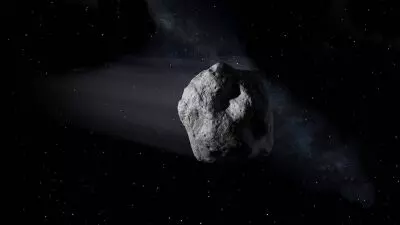
Japan's Hayabusa2 explores possibility of water brought to Earth by asteroids
text_fieldsTokyo: According to research from Japan's Hayabusa2 space mission, asteroids carried water and organic matter to Earth.
According to Kyodo News, the research, which was published in the scientific journal Nature Astronomy, clarifies the mystery of how the Earth, which was almost totally made of molten magma during its initial formation, came to be covered in water.
The analysis was produced by a group of astronomers from the Japan Aerospace Exploration Agency using samples taken from the Ryugu asteroid by the Hayabusa2 space probe.
"In a broad sense, it is possible that small celestial bodies brought things that led to water and life on Earth," Motoo Ito, a senior researcher of geomaterials science at the Japan Agency for Marine-Earth Science and Technology, was quoted as saying.
In December 2020, a capsule that had been carried on a six-year mission by Hayabusa2 delivered more than 5.4 grams of surface material to Earth from the Ryugu asteroid, located over 300 million km away.
While Ryugu particles displayed a close compositional match to that of Earth's water, there were some slight differences, leading researchers to hypothesise that Earth may have also sourced its water from places other than asteroids, the report said.
An analysis of eight particles, totalling approximately 59 milligrams, from the Ryugu asteroid found in almost all of their organic matter and water, not in liquid form but a hydroxyl group consisting of one oxygen atom bonded to one hydrogen atom, with a composition similar to that of water contained in cosmic dust and comets.
Protected by a "cradle" of phyllosilicates, they were believed to have endured harsh environmental changes after leaving the outer solar system, where water and organic matter are present.
Organic areas comprising a matter known as aliphatic hydrocarbon were also found within the relatively coarse-grained phyllosilicates. The surrounding coarse grains, which are more resistant to heat, may have prevented water and the organic matter from being altered by the environment, the report said.
Hayabusa2 left Earth in 2014 and reached its stationary position above Ryugu in June 2018 after travelling 3.2 billion km on an elliptical orbit around the Sun for more than three years.
The probe touched down on the asteroid twice the following year, collecting the first-ever subsurface samples from an asteroid.
Researchers have previously found that Ryugu, born from a parent body formed in the outer solar system, travelled to the inner solar system and that its particles contain amino acids -- organic compounds said to be the "source of life."
With inputs from IANS























